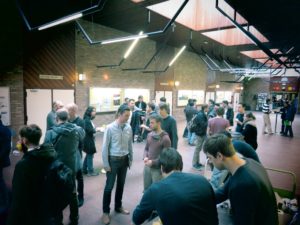 On the 7th of March 2017, the Antwerp Young Minds section invited Professor Doctor Jean Dalibard to give a colloquium at the University of Antwerp about his work on topology-related effects in 2D quantum gases. The target audience were the students and researchers of the University of Antwerp physics department, many of whom attended the lecture.
On the 7th of March 2017, the Antwerp Young Minds section invited Professor Doctor Jean Dalibard to give a colloquium at the University of Antwerp about his work on topology-related effects in 2D quantum gases. The target audience were the students and researchers of the University of Antwerp physics department, many of whom attended the lecture.
Professor Jean Dalibard is a professor at Collège de France and researcher at the Kastler Brossel Laboratory. His research focuses on the study of quantum gases, in particular Bose-Einstein condensates, and explores, among other subjects, the properties of rotating and low dimensional gases. His work on topologic transitions and other topology-related effects in 2D quantum gases served as a very fascinating subject for the colloquium, especially because of its close connection to the 2016 Nobel Prize in Physics.
Professor Dalibard began his talk with a general introduction on the subject of quantum gases in order to make those who might not yet be familiar with these systems acquainted with the topic. Subsequently, he focused on the key aspects of 2D quantum gases such as their topological transition to a superfluid state. He also addressed other topology-related effects in these systems, related to the creation of artificial gauge fields and quantum-Hall type phenomena. The colloquium as a whole was a great occasion for students to be introduced to the concepts of quantum gases, topology and the subject of last year’s Nobel Prize, while at the same time providing the researchers of our department with more profound insights into the underlying theory of these phenomena.
The lecture was followed by a reception, where the audience members and speaker could enjoy a drink and a bite. This also presented our students and researchers with the opportunity to speak with professor Dalibard in a more informal setting than the lecture itself.
The colloquium received a lot of positive feedback from the students and researchers who attended it.
